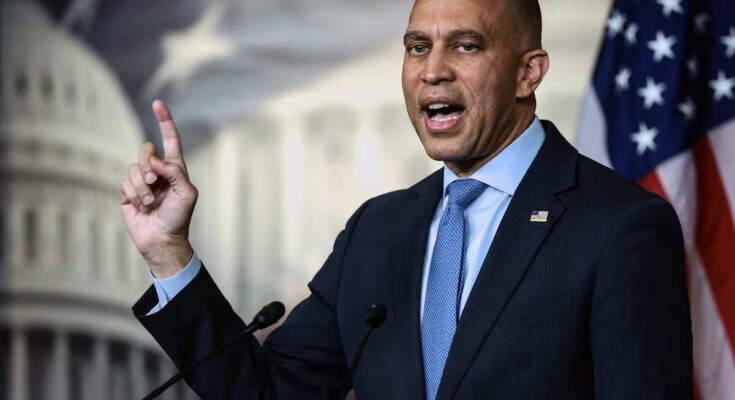The defection of seven Democratic senators and one independent opened the doors at around midnight (local time) on Sunday to the end of the longest partial government shutdown in the history of the United States, which this Monday, having entered its seventh week, reached its forty-first day. It also brought the party back to familiar ground: the existential crisis from which they seemed to emerge after a long year in it, after the resounding victories of November 4 in New York, New Jersey and Virginia.
The support of voters seemed to reward at the polls the Democratic opposition to the President of the United States, Donald Trump, and, above all, the refusal to agree with rivals to reopen the tap of the administration until the Republicans commit to ensuring that part of the health coverage included in the Obamacare program does not disappear at the end of the year, as expected. These are subsidies approved during the pandemic, and their foreseeable end will cause the price of health insurance for millions of Americans to skyrocket.
So why give in right now to a pact that does not include this conquest? The same question is being asked by 40 colleagues in the Senate, who on Sunday voted against the new Republican financing proposal. It is still in the approval phase (it must receive final approval in the lower house, be approved by the House of Representatives and receive the signature of the president), but, after 14 failed votes, something can already be taken for granted: the conservatives have finally reached the qualified majority of 60 votes required by the filibuster rules in the Senate (where they have 53 seats and one dissident: the veteran Rand Paul, of Kentucky).
The leader of the Democratic minority in the House of Representatives, Hakeem Jeffries, spoke to the press this Monday at noon in the Capitol to say what he had already said on his social networks: not even his people will vote in favor of the new proposal, because it contributes, he added, to “aggravating the health crisis” that the country is going through.
The defectors, three of whom – John Fetterman (Pennsylvania), Catherine Cortez Masto (Nevada) and Angus King (Maine) – voted with the Republicans from the beginning, held a press conference Sunday evening to try to justify themselves, saying that the agreement they supported was “the only possible agreement” and underlining how Yes It includes: reopening the tap of the Federal Administration until the end of January, when there could be a new crisis, funding the food stamps on which 42 million people depend during the 2026 fiscal year and the commitment that the Trump administration will reinstate officials fired during these 41 days, that it will retroactively pay lost wages for those who kept their jobs and that it will not fire any more federal employees in the next two and a half months.
Criticism of Schumer
Members of the group, which includes New Hampshire Senators Jeanne Shaheen and Maggie Hassan, Tim Kaine (Virginia), Dick Durbin (Illinois) and Jacky Rosen (Nevada), voted for different reasons: from concern about Kaine’s legion of officials in his state to pressure from Nevada’s tourism industry. Whatever their reasons, they all faced similar criticism from their own people on Monday. In Shaheen’s case, censure for the capitulation even came from her daughter, fellow Democratic politician Stefany Shaheen, who expressed her disappointment on social networks.
The shock wave also hits the Democratic leader in the Senate, Chuck Schumer, whose co-religionists accuse him of having failed to maintain cohesion within his ranks. “It’s no longer good and should be replaced. If he can’t lead the fight to stop skyrocketing health insurance premiums for Americans, why will he fight?” Rep. Ro Khanna, D-California, said in a social media post Sunday. Ezra Klein, perhaps the most influential columnist on the party, wrote, for his part, an article on The New York Times titled: “What Do Democrats Think?”
The pact – reached, according to Klein, “in exchange for very little” – also includes a commitment to vote in the Senate on the extension of Obamacare subsidies (the name given to the Affordable Care Act by the president who promoted it), even if it seems clear that it will be of little use. Neither the Republicans nor Trump, who has been attacking this rule for days, seem very willing to be convinced on this point by their rivals. The dissidents argue that this vote will at least give their rivals the opportunity to reflect on this issue, which worries Americans so much.
Meanwhile, Sunday’s agreement in the Senate is just the beginning of the process that will lead to the opening of the Government, hopefully by the end of the week, which, to make matters more complicated, includes a holiday this Tuesday, Veterans Day. Republican Majority Leader Mike Johnson appeared Monday morning to warn members of Congress to return to Washington as soon as possible to vote. He gave them 36 hours to get back to Washington.
The lower house has been in recess since before Johnson’s government shutdown began. Once the proceedings resume, Democrats will force a vote, with the help of a handful of Republicans, to force the Justice Department to make the news public. Epstein Documents, corresponding to the trials against the billionaire pedophile. He died in 2019 before facing justice, as he awaited his fate in a New York cell. Epstein was a friend of Trump and the president’s name, which has not been linked to any of the financier’s crimes, appears again and again in those newspapers.
This Monday, Trump intervened in the battle of the Capitol from his social network Truth, with a message in which he promised a bonus of “10,000 dollars” for “patriotic” air traffic controllers who continued to work in recent weeks, despite not receiving their salaries. For the rest he issued a threat which it is not clear what it will translate into: “For those who have done nothing but complain and take days off (…) I AM NOT HAPPY WITH YOU. (…) You will have a negative point, at least for me, on your file”.
These federal employees, like airport security officers, are considered essential workers. The rest of the public employees, around 750,000, are suspended from pay, but also from employment, during the possible closure of the Administration. Everyone feared that Trump would carry out another threat: not to pay them retroactively. That fear dissipated after learning the details of the Senate deal.
Among the consequences of the government shutdown – which has caused the paralysis of dozens of federal agencies and the closure or abandonment of museums, monuments and natural parks; pushed thousands of employees into food banks and suspended the distribution of vouchers on which millions of disadvantaged people depend; perhaps the effects on air traffic were the most serious. Furthermore, those who put the most pressure on legislators.
The United States Air Authority’s (FAA) decision to cancel hundreds of flights at 40 major U.S. airports took effect last Friday to address air saturation due to controllers resigning or resigning. After a chaotic weekend, 1,485 flights were expected to be canceled and 825 delayed this Monday, according to the FlightAware website. The situation worsened as the hours passed.
It is unknown when American airports will return to normal. As the process of reopening the government moved slowly at the Capitol, no one on Monday could guarantee when the longest shutdown in U.S. history will end. Nor what was the point of so much suffering. In Washington, the most recurring question in the aftermath of the capitulation of eight senators is whether the agreement reached in the Senate on Sunday could have been reached by the boxers even before putting on the gloves on October 1.



